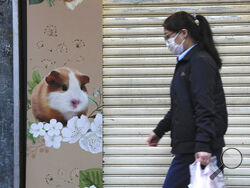HONG KONG (AP) — Hong Kong authorities said Tuesday that they will cull some 2,000 small animals, including hamsters after several of the rodents tested positive for the virus at a pet store where an infected employee was working.
The city will also stop the sale of hamsters and the import of small mammals, according to officials from the Agriculture, Fisheries and Conservation Department. The move came after the pet shop employee tested positive for the delta variant on Monday. Several hamsters imported from the Netherlands at the same store tested positive as well.
“If you own a hamster, you should keep your hamsters at home, do not take them out," said department director Leung Siu-fai at a news conference.
“All pet owners should observe good personal hygiene, and after you have been in contact with animals and their food, you should wash your hands."
“Do not kiss your pets,” he added.
Even though authorities acknowledged that there is “no evidence” that pets can transmit the coronavirus to humans, as a precautionary measure, customers who had purchased hamsters from the affected store after Jan. 7 will be traced and be subject to mandatory quarantine.
They must also hand over their hamsters to authorities to be put down.
Authorities said that all pet stores selling hamsters in Hong Kong must cease operations and that around 2,000 small mammals, including hamsters and chinchillas, will be culled in a humane manner.
Customers who bought hamsters in Hong Kong from Dec. 22 will also be subject to mandatory testing and are urged not to go into the community until their tests have returned negative. If their hamsters test positive, they will be subject to quarantine.
For now, authorities said they would not rule out transmission between human and animals.
Separately, Hong Kong police have arrested two former flight attendants for allegedly leaving their homes when they should have been in isolation for possible coronavirus infections, which were later confirmed.
The two arrived from the U.S. on Dec. 24 and 25. While in medical surveillance, they had “conducted unnecessary activities,” according to a government statement posted late Monday.
While the statement did not name their employer, the arrests came after flagship carrier Cathay Pacific said it had fired two crew members for breaching coronavirus protocols. Both later tested positive for the omicron variant.
Cathay previously said the actions of the crew who had broken coronavirus protocols was “extremely disappointing” and apologized for the disruption. The company had to cut back on flights — both passenger and cargo — in January amid tightened virus curbs.
The duo have been released on bail and will have their case heard in court on Feb. 9. If convicted of violating anti-epidemic regulations, they could face up to 6 months imprisonment and a fine of up to 5,000 Hong Kong dollars ($642).
Hong Kong has been grappling with a local omicron outbreak traced to several Cathay Pacific crew members who had dined at bars and restaurants across the city before later testing positive for the omicron variant.
Previously in Hong Kong, certain air and sea crew members could isolate at home under certain quarantine exemptions. Regulations tightened Dec. 31 require crew members to isolate in a designated quarantine hotel for about a week to safeguard public health.
___

